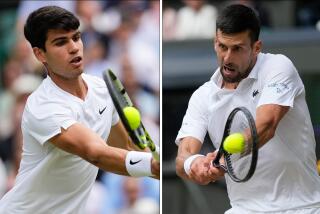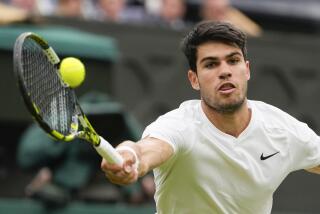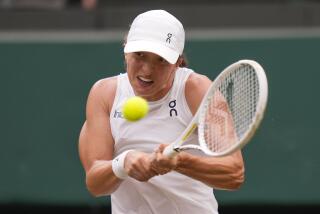Federer’s lost match reemerges
- Share via
WIMBLEDON, England -- A peculiar, obscure tennis match from Tuesday, June 25, 2002, has breathed on ever since with a relevance few in its Centre Court audience would’ve forecast.
On that afternoon, the defending Wimbledon champion remained Goran Ivanisevic of Croatia. Pete Sampras lingered one day from his last Wimbledon match, an incomprehensible loss to 145th-ranked George Bastl. And an 18-year-old qualifier from Croatia, Mario Ancic, ranked No. 154, played his first Grand Slam match.
He beat Roger Federer, 20 years old and seeded No. 7, 6-3, 7-6 (2), 6-3, becoming the first teenager to win a Centre Court debut since 1972.
Ancic said of Federer, “I knew him from TV.”
Federer said of Ancic, “I knew he was young; I didn’t know much more.”
Federer said, “I’m terribly down right now.”
He must’ve meant it, for that’s the last match Federer lost on Wimbledon or on grass, so it provides some distant backlighting for Wednesday’s Federer-Ancic quarterfinal at Wimbledon 2008.
At the time, Ancic seemed an Ivanisevic replica, hailing from the same Croatian city (Split), offering the same deadpan wit and bombing a similarly pulverizing serve.
Perhaps, some might have thought, this promising young Federer and this audacious young Ancic might grapple for future Wimbledon titles.
“No, that’s not how I felt when I played him,” Federer said Monday after beating Lleyton Hewitt, 7-6 (7), 6-2, 6-4.
He felt mere shock.
The year before, Federer’s ample promise had sparkled in a classic five-set win over Sampras. Federer came in as one of the hip favorites alongside Hewitt, Tim Henman and maybe even Sampras.
“I completely underestimated him back in 2002 when I played him,” Federer said. “I played a great Wimbledon the year before . . . I mean, I just thought, you know, I’ll play a little bit of serve and volley. I expected him to stay back and it was the opposite. I couldn’t serve and volley because I thought conditions were slow. He served and volleyed first and second serves, I can remember.
“I got completely surprised. He played well till the very end. I was a little shell-shocked and didn’t know what happened to me.”
Then Ancic moved along to play Jan Vacek of the Czech Republic in the second round, where he promptly lost in straight sets and deepened Federer’s lost-opportunity shock.
As hidden treasure, though, the match did provide a primer: “What it taught me was not to underestimate any opponent, no matter where they’re from, what technique they have, what ranking they have,” Federer said.
Before that, Federer recollects, he’d engaged in a certain snobbery when he spotted newness on tour or technique he deemed improper. As he walked off that Tuesday and said, “I was looking forward to this tournament so much, but I couldn’t figure out his serve,” it’s clear he’d learned so much more than many first-round losers.
“He was not Roger Federer at that time,” Ancic said. “Of course, I mean, I can sit here and talk stories about how it was a great win and how I beat Roger Federer, but actually it wasn’t Roger Federer as we know him today.
“It was the up-and-coming, top-10 player who was at that moment struggling on Grand Slams.”
Still lacking any Grand Slam titles in 2003, Federer started Wimbledon fourth-seeded against Lee Hyung-taik of South Korea.
He won that first-round match by the same set scores -- 6-3, 6-3, 7-6 (2) -- he’d lost to Ancic, went on to win the tournament, and would play rivalries against Sampras only in the tennis encyclopedias and later against Rafael Nadal in two straight Wimbledon finals.
As he prepares to play Ancic at Wimbledon for a second time since the lost Tuesday, the bygone match still marks a milepost preceding 38 consecutive Wimbledon victories (plus a walkover).
“If it was not for that,” Ancic said, “I think people would pretty much forget about that win.”
--
Begin text of infobox
Wimbledon: Day 8
A look at who won, who lost and what’s next at the All England Club. World rankings in parentheses:
Who won
* Venus Williams, United States (7) -- defeated Alisa Kleybanova, Russia (42), 6-3, 6-4 -- A defending champion put off-Broadway on claustrophobic Court No. 2, which her father and some others found “ridiculous,” Williams continued her long drive on the high road. Declining to comment, she said, “Let’s keep it on the real. I’m here for the tennis.”
* Serena Williams, United States (6) -- defeated Bethanie Mattek, United States (69), 6-3, 6-3 -- Number of sets the Williams sisters lost in the first four rounds: zero. Number of players remaining in the draw who can bring the experience of having been to a Wimbledon semifinal: zero. Hope for these players: close to zero.
* Williams/Williams, United States (11th-seeded) -- defeated Anabel Medina Garrigues/Virginia Ruano Pascual, Spain (fifth-seeded), 6-1, 6-4 -- They played this one on Court No. 2 as well, for a sort of tripleheader. Maybe they secretly like Court No. 2.
* Roger Federer, Switzerland (1) -- defeated Lleyton Hewitt, Australia (27), 7-6 (7), 6-2, 6-4 -- Federer, who hasn’t played on Court No. 2 since the 2003 quarterfinals, pointed out that seven-time champion Pete Sampras played Court No. 2 for his last Wimbledon match, a second-round loss to George Bastl in 2002. Of course, you could always say that at least such an unsightly farewell had a smaller crowd.
* Rafael Nadal, Spain (2) -- defeated Mikhail Youzhny, Russia (17), 6-3, 6-3, 6-1 -- Youzhny took Nadal to five sets here in 2007, but said that by now, “It doesn’t matter if it’s grass or clay.” Scarier tennis words seldom have surfaced.
* Asia -- Tamarine Tanasugarn, Thailand (60) and Jie Zheng, China (133) combined to give the world’s largest continent two Wimbledon quarterfinalists for the first time. Tanasugarn, 31, who had been to six Wimbledon fourth rounds in one of the least-known impressive statistics on earth, said, “Can I say, wow, wow, wow?”
Who lost
Jelena Jankovic, Serbia (3) -- lost to Tanasugarn (60) 6-3, 6-2 -- “I was almost playing in the parking lot,” said the injured Jankovic, who got Court No. 18. “I almost needed a helicopter to get to my court.”
Svetlana Kuznetsova, Russia (4) -- lost to Agnieszka Radwanska, Poland (11), 6-4, 1-6, 7-5 -- Kuznetsova could have vaulted to No. 1 in the world had she reached the semifinal. But then, nobody much wants that role.
Women’s quarterfinals
* Venus Williams (7) vs. Tanasugarn (60) -- “I play her many times and she kick my butt,” Tanasugarn said of Williams. It’s good not to be alone in life.
* Serena Williams (6) vs. Radwanska (11) -- After Monday’s match, Williams said she believes her capability exceeds her ranking. Given how the elite players have cratered to make this the first Grand Slam of the 40-year Open era without a top-four seeded player in the quarterfinals, it’s clear she’s not delusional.
* Zheng (133) vs. Nicole Vaidisova, Czech Republic (22) -- If you think of it, there’s always a chance this could be the most-watched Wimbledon quarterfinal in history. (Hint: China.)
* Elena Dementieva, Russia (5) vs. Nadia Petrova, Russia (18) -- Entering the quarterfinals, Dementieva was the highest-seeded player left. If you bet that in your office pool . . . well, no, you really shouldn’t be having office pools on these things.
-- Chuck Culpepper
More to Read
Go beyond the scoreboard
Get the latest on L.A.'s teams in the daily Sports Report newsletter.
You may occasionally receive promotional content from the Los Angeles Times.










